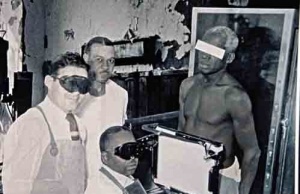Difference between revisions of "Guatemala syphilis experiment"
(image) |
(fatalities) |
||
| Line 3: | Line 3: | ||
|start=1946 | |start=1946 | ||
|end=1953 | |end=1953 | ||
| + | |fatalities=83 | ||
| + | |injuries=1217 | ||
|image=Guatemala syphilis experiment.jpg | |image=Guatemala syphilis experiment.jpg | ||
|perpetrators=U.S. Public Health Service, U.S. National Institutes of Health | |perpetrators=U.S. Public Health Service, U.S. National Institutes of Health | ||
| Line 10: | Line 12: | ||
==Background== | ==Background== | ||
The [[U.S. Public Health Service]] was facing problems after [[World War II]] with a lot of veterans suffering from sexually transmitted diseases. The experiments were lead by the US PHS, funded by a grant from the [[U.S. National Institutes of Health]] to the [[Pan American Sanitary Bureau]]. They were carried out even as the [[Doctors' trial]] was ongoing - in which US military [[authorities]] tried [[German]] doctors for [[war crime]]s after they were found to have carried out analagous research. The publication of the [[Nuremerg Code]] did nothing to stop these experiments, but may have added to their perpetrators' desire for secrecy. | The [[U.S. Public Health Service]] was facing problems after [[World War II]] with a lot of veterans suffering from sexually transmitted diseases. The experiments were lead by the US PHS, funded by a grant from the [[U.S. National Institutes of Health]] to the [[Pan American Sanitary Bureau]]. They were carried out even as the [[Doctors' trial]] was ongoing - in which US military [[authorities]] tried [[German]] doctors for [[war crime]]s after they were found to have carried out analagous research. The publication of the [[Nuremerg Code]] did nothing to stop these experiments, but may have added to their perpetrators' desire for secrecy. | ||
| + | |||
| + | ==Experiment== | ||
| + | At least 83 people are reported to have died out of 1300 who were infected, from about 5500 involved in the study, which included mentally ill patients. The study had no consent forms and patients were not informed of what was really going on.<ref>http://www.bbc.co.uk/news/world-latin-america-14712089</ref><ref>http://pubrecord.org/world/9685/u-s-guatemala-syphilis-experiments/</ref> | ||
==Termination== | ==Termination== | ||
| Line 15: | Line 20: | ||
==Exposure== | ==Exposure== | ||
| − | Information about these experiments was uncovered by Professor [[Susan Mokotoff Reverby]] of Wellesley College. Reverby found documents in 2005 in Cutler's archived papers while researching the [[Tuskegee syphilis study]]. Later she discovered that they related to a wholly unknown experiment which was carried out outside the US because of legal concerns. | + | Information about these experiments was uncovered by chance by Professor [[Susan Mokotoff Reverby]] of Wellesley College. Reverby found documents in 2005 in Cutler's archived papers while researching the [[Tuskegee syphilis study]]. Later she discovered that they related to a wholly unknown experiment which was carried out outside the US because of legal concerns. |
==Response== | ==Response== | ||
Revision as of 04:16, 24 July 2016
 | |
| Date | 1946 - 1953 |
|---|---|
| Perpetrators | U.S. Public Health Service, U.S. National Institutes of Health |
| Deaths | 83 |
| Injured (non-fatal) | 1217 |
| Exposed by | Susan Mokotoff Reverby |
| Description | A murderous experiment which infected healthy subjects with syphilis, gonorrhea, chancroid and possibly other diseases. |
Background
The U.S. Public Health Service was facing problems after World War II with a lot of veterans suffering from sexually transmitted diseases. The experiments were lead by the US PHS, funded by a grant from the U.S. National Institutes of Health to the Pan American Sanitary Bureau. They were carried out even as the Doctors' trial was ongoing - in which US military authorities tried German doctors for war crimes after they were found to have carried out analagous research. The publication of the Nuremerg Code did nothing to stop these experiments, but may have added to their perpetrators' desire for secrecy.
Experiment
At least 83 people are reported to have died out of 1300 who were infected, from about 5500 involved in the study, which included mentally ill patients. The study had no consent forms and patients were not informed of what was really going on.[1][2]
Termination
The experiment lasted until at least 1953, possibly longer.[3]
Exposure
Information about these experiments was uncovered by chance by Professor Susan Mokotoff Reverby of Wellesley College. Reverby found documents in 2005 in Cutler's archived papers while researching the Tuskegee syphilis study. Later she discovered that they related to a wholly unknown experiment which was carried out outside the US because of legal concerns.
Response
In October 2010, Hillary Clinton and Kathleen Sebelius made a verbal apology.[4][5][6][7] A class action lawsuit was brought on behalf of the victims, but the United States government claimed "sovereign immunity" under the Federal Tort Claims Act, stating that the US Supreme Court "clarified" that the immunity statute "bars all claims based on any injury suffered in a foreign country, regardless of where the tortuous act or omission occurred." The U.S. Department of Health and Human Services promised to invest about $1.8 million while the CDC promised $775,000 over three years to aid in prevention and monitoring of HIV and other sexually transmitted diseases in Guatemala.[8][9]
References
- ↑ http://www.bbc.co.uk/news/world-latin-america-14712089
- ↑ http://pubrecord.org/world/9685/u-s-guatemala-syphilis-experiments/
- ↑ http://www.unwelcomeguests.net/711
- ↑ "Joint Statement by Secretaries Clinton and Sebelius on a 1946-1948 Study", U.S. Department of Health & Human Services, October 1, 2010
- ↑
{{URL|example.com|optional display text}} - ↑
{{URL|example.com|optional display text}} - ↑ https://www.icrc.org/eng/assets/files/other/irrc_851_weeramantry.pdf
- ↑ http://edition.cnn.com/2012/01/10/world/americas/us-guatemala-std-experiments/
- ↑ http://www.csmonitor.com/World/Americas/2013/0614/Guatemalan-syphilis-victims-lose-hope-in-legal-battle-against-US